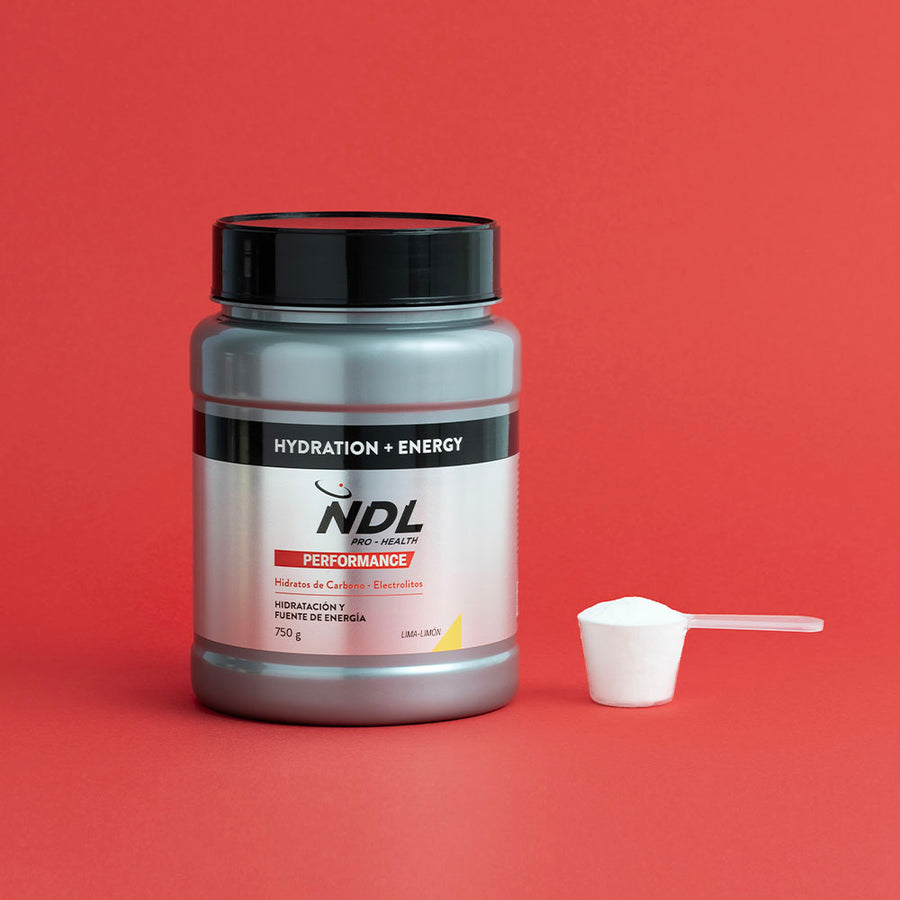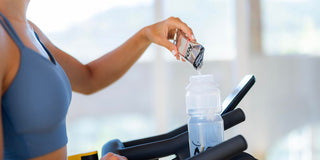Featured Products

Hydration + Energy
See productIsotonic drinks are formulations designed to rehydrate the body and replenish electrolytes and carbohydrates lost during intense exercise.
Its concentration of solutes, similar to that of body fluids, allows rapid and efficient absorption of water and nutrients, facilitating recovery and maintenance of physical performance.
What are isotonic drinks?
Isotonic drinks are beverages designed to rehydrate the body and replenish electrolytes and carbohydrates lost during intense or prolonged exercise in often extreme weather conditions.
These beverages have a concentration of solutes (such as salts and sugars) similar to that of body fluids, which allows rapid and efficient absorption of both water and nutrients by the body.
Specifically, the concentration of solutes in an isotonic drink is usually in the range of 6-8% (6 to 8g per 100ml of water).
In addition to carbohydrates, the composition of an isotonic drink contains sodium, potassium, calcium and magnesium as the main electrolytes. Sodium, for example, is usually between 20 and 60 mmol/l, which helps to replenish salts lost through sweat.
Due to their properties, these drinks are highly recommended to maintain balance, avoid dehydration and prevent loss of performance.
Symptoms of dehydration are: intense thirst, dry and sticky mouth, dark colored urine (observe before sports practice), infrequent urination, fatigue or weakness, dizziness or lightheadedness, confusion or disorientation, dry skin, fast or irregular heartbeat, headaches, muscle cramps and fainting.
Benefits of Isotonic Drinks
The following are the main benefits of isotonic beverages, especially for people who perform intense or long-lasting physical activities:
- Rapid rehydration: due to their concentration of solutes similar to that of body fluids, isotonic beverages are rapidly absorbed into the body, helping to replenish water lost through sweat.
- Electrolyte replenishment: these drinks contain electrolytes such as sodium, potassium, calcium and magnesium, which are essential for maintaining fluid balance, muscle and nerve function. Replenishing these electrolytes is crucial during and after exercise.
- Energy supply: isotonic drinks usually contain carbohydrates, which provide a quick source of energy to maintain physical performance, especially in endurance sports such as running, cycling, swimming, tennis, etc.
- Prevention of muscle cramps: by maintaining electrolyte balance, isotonic drinks help prevent muscle cramps that can occur due to excessive loss of salts through sweating.
- Improved performance: maintaining good hydration status and proper electrolyte balance can help improve athletic performance and delay fatigue.
- Post-exercise recovery: after intense exercise, isotonic drinks help restore muscle glycogen levels and rebalance electrolytes, which facilitates recovery.
- Improved cognitive function: Staying hydrated is key to brain function, and isotonic drinks can help prevent the decline in concentration and focus that often accompanies dehydration.
- Prevention of hyponatremia: In prolonged endurance events, excessive consumption of water without electrolytes can cause hyponatremia (low blood sodium levels). Isotonic drinks help prevent this problem by providing an adequate sodium balance.
Difference between isotonic and energy drinks
It is important to know the difference between isotonic and energy drinks in terms of their composition, purpose and effects on the body.
Here are the main differences between the two:
Isotonic drinks
- Purpose: to rehydrate the body, as well as replenish electrolytes and carbohydrates lost during physical exercise. They are designed to help maintain fluid and electrolyte balance, and provide a quick source of energy through simple carbohydrates.
- Common use: during or after intense or long-lasting physical activities, such as running, cycling or team sports.
Energy drinks:
- Purpose: to provide an energy boost and improve concentration and mental alertness. They contain stimulants such as caffeine, guarana and other ingredients such as taurine or B vitamins that temporarily increase energy levels.
- Use: they are consumed primarily to increase alertness, improve mental performance and reduce fatigue, but are not specifically designed for hydration or physical performance during exercise.
The main difference is that isotonic drinks are designed for rehydration and nutrient replenishment during physical activity, whereas energy drinks are designed to provide a temporary energy boost and improve concentration, but not to rehydrate or replenish electrolytes.
Types of isotonic beverages
The different types of isotonic drinks have the same objective, which is to provide electrolytes and carbohydrates, which will be superior to water as a rehydration drink during moderate to intense exercise.
They usually contain sodium as the main electrolyte and carbohydrates such as sucrose and glucose (maltodextrin). Glucose, sucrose, fructose, and maltodextrins (glucose polymer) are appropriate carbohydrates to compose a sports drink. In fact, because each carbohydrate enhances fluid absorption in the intestine by different pathways, having several types of carbohydrates in a rehydration drink can be beneficial.
When salts and carbohydrates are added to water, gastric emptying improves, thus improving its transport from the intestine to the blood compared to when only water is drunk. Salt also improves the absorption of water in the intestine.
Salt in a sports drink stimulates thirst through the brain and minimizes urine formation in the kidneys, thus improving the body's ability to retain body water.
On the other hand, potassium, although to a lesser extent than sodium, plasma potassium levels tend to fall during exercise. Potassium is essential for isotonicity, electrolyte balance, nerve transmission and active transport mechanisms.
In addition to the standard isotonic drink, there are also caffeinated drinks to provide an extra boost of energy and improve concentration.
Likewise, there are isotonic drinks with proteins to help muscle recovery after exercise. Also, isotonic drinks with additional electrolytes formulated with specific electrolytes for people who lose large amounts of these minerals.
And finally, we can find low-calorie isotonic drinks with a lower amount of carbohydrates that would be suitable for people who want to rehydrate without consuming a lot of calories, such as during lighter workouts or for those who control their caloric intake.
Each type of drink is designed to meet specific needs, so the choice will depend on factors such as type of physical activity, duration of exercise, climate and personal preferences. Even the same type of drink can be modified by diluting it more or less depending on the time and situation.
It is important that the drink has a pleasant taste. If it is cold, it improves the taste and the athlete will drink more.
When and how to consume isotonic beverages?
The adequate consumption of isotonic beverages depends on the type of physical activity performed, intensity, duration and environmental conditions.
Guide on how and when to drink isotonic beverages:
- Before exercise diluted with water: in this case we will add half the dose for the same amount of water obtaining a hypotonic drink. Approximately 1 hour before and we will drink sips. We ensure a good hydration before starting the exercise. This is especially important if you know you will sweat a lot or if the conditions are hot and humid.
- During: if the physical activity lasts more than 60 minutes, or if it is of high intensity and causes a lot of sweating. Drink small sips regularly during physical activity, every 15-20 minutes, rather than consuming large amounts at one time. The amount between 500ml and one liter per hour will normally be a combination of water and isotonic drink. Cool is preferable, but not extremely cold, as very cold drinks can cause stomach upset in some people.
- After: we can also use this type of drink to replenish fluids, electrolytes and carbohydrates. It could be the base of the recovery drink where we increase the amount of carbohydrates and also add protein.
It is important to customize isotonic drinks according to personal needs, not over-consume and alternate with water. Ideally, change the flavors so as not to get tired of them and then find it difficult to drink at important moments.

I have a diploma in Nutrition and dietetics from CESNID (University of Barcelona), a degree in Nutrition from Kin's College University of London, a postgraduate degree in Sports Nutrition and PNIE (Psychoneuroimmunoendocrinology) from the University of Barcelona, and a diploma in Ayurveda Nutrition, energy cooking and Naturopathy. Course Sport Nutrition at the Natural Gourmet Institute for Health and culinary arts in New York and co-owner of Ametlla + de Mallorca in Artà, I currently advise elite athletes and companies. Director of the nutrition department of Rafa Nadal Academy in Manacor and director of the master of Nutrition and sport of the University Alfonso X.

















